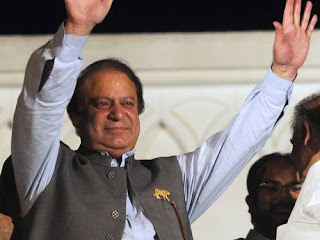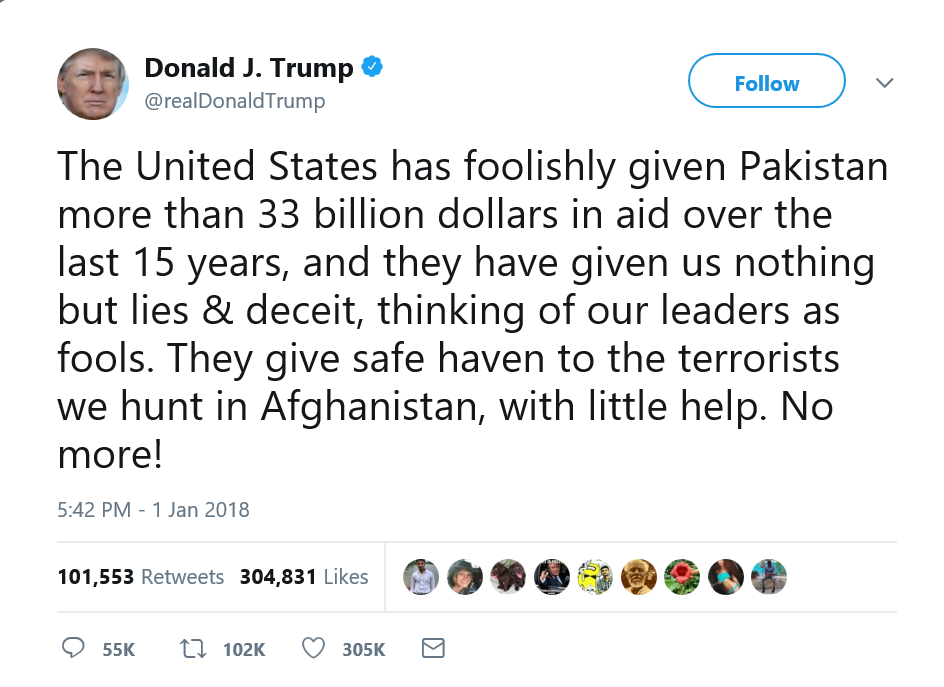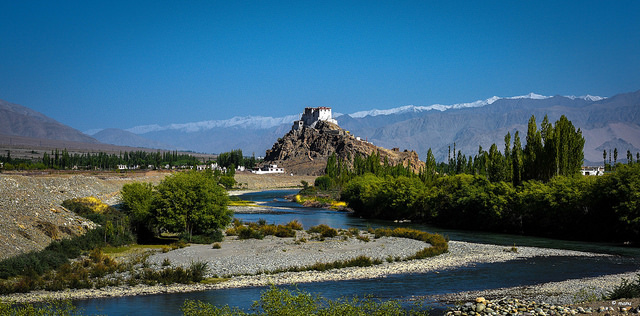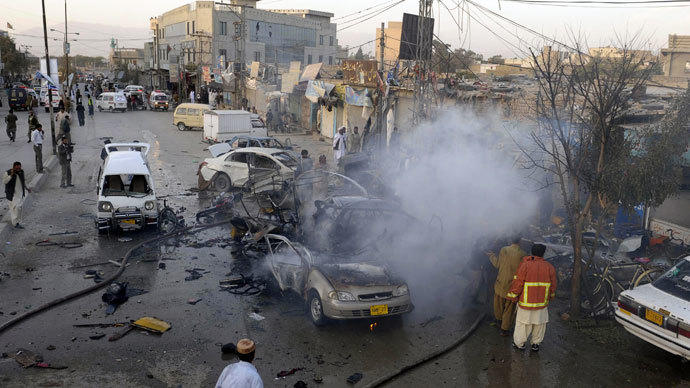Pakistan
A New Geopolitical Change in Pakistan and the International Response to it.
 |
| Source: The Independent |
In a highly deserving event Pakistan experienced something which it had rarely ever seen. People of Pakistan and the world has new hopes with the new democratic government that will be formed as Nawaz Sharif has declared his victory. It is not the first time that a people elected democratic government has formed in Pakistan, but transfer of power from one democratic government to another democratic government after successfully completing its term has been rare in the history of Pakistan. Its neighbour in the west, Afghanistan, had also managed to hold election and form a democratic government and its neighbour in the east, India is considered as the largest democracy in the world.
Relations with India
Relations with Afghanistan
Relations with United States
He referred to drone strikes as a challenge to sovereignty and said, “We will sit with our American friends and talk to them about this issue.”
Barrack Obama called Nawaz Sharif and congratulated him for his victory and congratulated people of Pakistan for successfully completion of democratic elections.
“The United States stands with all Pakistanis in welcoming this historic peaceful and transparent transfer of civilian power, which is a significant milestone in Pakistan’s democratic progress,” the statement quoted the President as saying. He further added, “You have affirmed a commitment to democratic rule that will be critical to achieving peace and prosperity for all Pakistanis for years to come.”
Relations with Iran
Nawaz Sharif spent nine years in exile in Saudi Arabia and developed close ties with the country’s leadership. This may case Nawaz Sharif to not to show much interest in Iran-Pakistan gas pipeline. Saudi Arabia had opposed Pakistan importing of natural gas from Iran pipeline when previous government went ahead with an agreement days before its term expired. Saudi Arabia is another big crude oil and gas exporter and it would like Pakistan to buy from it rather than Iran.
Nawaz Sharif will have to be careful in forming a solid middle east policy. If Nawaz Sharif listens to the US and Saudi Arabia, then Iran will lose confidence in Pakistan. And India, which is already increasing its presence in Iran and building roads and rail to Afghanistan and Central Asia, bypassing Pakistan, will take advantage of Pakistan’s negligence.
In this case Nawaz Sharif should consider opening land route for India to Afghanistan and Central Asia, this way India will lose interest in creating a land-sea corridor via Iran to Afghanistan and Central Asia. Land route via Pakistan will be much economical for India and beneficial for Pakistan as it can tax Indian vehicles plying on its soil.
Relations with China
Pakistan has always shared good relations with China. As said earlier, Pakistan’s foreign policy has been India centric and one of the reason China is its friend because China shares cold ties with India.
Beijing’s reaction on Sharif’s victory was too plain and restrained. There was no formal statement by any Chinese leader directly to Nawaz Sharif congratulating him on his election victory. It was only Chinese foreign ministry spokesman Hong Lei who expressed his satisfaction on smooth conduction of democratic elections in Pakistan. Surprising, because China rarely ever had any democratic election.
“China is glad to see that Pakistan’s general elections have been smoothly held,” Hong said. Later Official Xinhua news agency also quoted him saying “We are convinced that with joint efforts, the China-Pakistan strategic cooperative partnership will be lifted to a new level”.
Although China’s behaviour is so unexpected, which has always been the case with China, there is hardly any possibility of low level of ties between these two countries as both needs each other to check India. To name China doesn’t have many good friends which it can consider all-weather friend. China maintains very limited relations with other countries limited only to exports or taking contracts to build infrastructure. At this, losing Pakistan which considers it as an all weather friend and super power would not be in the China’s interest.
Hong Lei also announced that Chinese premier Li Keqiang will be visiting Pakistan after touring India from May 19 and before leaving for Germany and Switzerland. This would be the first meeting between the two new leaders and we will wait and compare the level of talks between India-China and China-Pakistan.
Response of other major countries
Most of the Islamic world was quick to acknowledge this victory and convey their greetings to the new leader of Pakistan.
President of United Arab Emirates, Sheikh Khalifa bin Zayed Al Nahyan, Ameers of Qatar and Kuwait congratulated Nawaz Sharif for his victory in the successful democratic elections. Iranian President Mehmood Ahmadinejad, and Turkish President Abdulallah Gul and Prime Minister Tayyeb Ardugan also conveyed his greetings to Nawaz Sharif along with Deputy Prime Minister of Kingdom of Saudi Arabia, Prince Maqran Bin Abdul Aziz who called Nawaz Sharif to greet him with good wishes. British Prime MInister, David Cameron also congratulated him and praised him for his commitment for prioritizing economic reforms.
Challenges in front of Nawaz Sharif
One of the major challenge in front of Nawaz Sharif is improving his image in the southern states of Pakistan. Nawaz Sharif, in his previous terms, was often accused of giving more stress on infrastructure and beautification in his native Punjab and Kashmir while neglecting other states like Sindh, Balochistan.
Nawaz Sharif has assured that his party PML-N has a very ambitious agenda and in the coming first 100 days of his rule he would come out with policies on all major issues challenging Pakistan, such as terrorism, energy crisis and the economy. On the issue of internal security and terrorism he said that he will devise a national policy on terrorism consulting every political party.
For us it will be interesting to see how Pakistan’s economy and foreign policy performs in the coming one or two years. We may expect Nawaz Sharif visiting India and European countries within a year of his term. He has gained the victory with almost majority which will give him confidence to take even risky steps.
Pakistan
‘No More!’ The Geopolitical Impact of Souring Relations Between the United States and Pakistan

A Donald Trump led the United States of America bade farewell to the year 2017 in isolation after the contentious Jerusalem issue saw the rest of the world stand united against them in a historic resolution at the UN. They went away with the promise that this stand against them would be remembered by them when the international body, as well as many other countries, looked towards them in their time of need. Now, the USA still seems unfettered in its approach towards having its way on matters of priority as it looks set on losing a long-standing ally in Pakistan. The issue at hand is of the billions of dollars that Pakistan has received in aid from the US to help fight against terrorism in the middle east and the country’s alleged inaction towards the same.
A New Year Resolution: As it happened
Trump’s first tweet of 2018 went as follows. “The United States has foolishly given Pakistan more than 33 billion dollars in aid over the last 15 years, and they have given us nothing but lies and deceit, thinking of our leaders as fools. They give safe haven to the terrorists we hunt in Afghanistan, with little help. No more!” Then, on Thursday, the U.S. State Department announced that most of the security assistance to Pakistan will be suspended unless there is decisive action on their part against the various militant groups on its soil. The US has already withheld $255 million in military aid to Pakistan, and this move paints a picture of rapidly deteriorating ties between the two countries that have been allies ever since Pakistan was born in 1947.
In response to the allegations and the remarks, Pakistan Foreign Minister Khwaja Asif has said that the country is “ready to publicly provide every detail of the US aid that it has received.” He also added, “We have already told the US that we will not do more, so Trump’s ‘no more’ does not hold any importance.” The Pakistani ambassador to the United Nations Maleeha Lodhi also chimed in at the international body earlier in the week, ” We have contributed and sacrificed the most in fighting international terrorism and carried out the largest counterterrorism operation anywhere in the world.” She added, “We can review our cooperation if it is not appreciated.” The tone is clear. Pakistan does not look like it is willing to bow down to Trump and as far as the cut in aid is concerned, it is not easy to estimate exactly what the amount is in question. Current estimates put the figure at over $900 million. It is also important to keep in mind that the aid to Pakistan in question has already been deteriorating over the years.
So is there enough reason for Pakistan to be worried?
It’s then worth a look whether this move by the US is enough in itself to make Pakistan act the way it wants it to. More importantly, how much is Pakistan likely to suffer, if at all, from the announced cut in the aid? Despite, the Prime Minister Shahid Khaqan Abbasi’s claims that the aid from the US does not amount to much today, experts believe that the cuts will cause short-term problems for the Pakistani military. “It will also be a setback in the long term as China or any other friendly country cannot totally replace the resources that Pakistan needs to keep its military machine well oiled”, says Prof. Hasan Askari Rizvi, a defence analyst and author of ‘Military, State and Society in Pakistan’. As cooperation between the two countries looks increasingly unlikely, critics of Pakistan’s inaction have also called for stripping of the nation’s title as a non-NATO ally and imposition of sanctions to coerce them into following the US vision.
The risks involved with tough measures
It is important to remember however that the US is dealing with a double-edged sword here. In recent years Pakistan has tried to make it clear that it is not as dependent on the US as many would make it seem. Pakistan is still the key to most of the involvement of the United States in Afghanistan since it controls most of the supply lines for the transfer of material into the country. Should Pakistan deny the US access to these lines, the US may face a six-fold increase in costs to over a $100 million in order to move military equipment and personnel into Afghanistan.
The US does not want instability in Pakistan since that could have drastic consequences for the region. Perhaps it is for that reason that they’re still providing Pakistan with non-military aid, albeit more carefully. Neither does Pakistan want a situation where it is completely cut off from the United States for that could deal a severe blow to them in their attempts to portray themselves as a more responsible nation and check India’s power in the subcontinent. However, should the matter at hand take a turn for the worse, the US won’t need a second invitation to pursue a more aggressive approach in the region with more involvement from India and Afghanistan. Pakistan, on the other hand, will almost certainly have the backing of its all-weather ally China in countering the move to maintain a power balance in South Asia when the game is afoot for a new geopolitical competition, with the same old motives.
India
Struggling over Water Resources: The case of India and Pakistan

flickr/lensnmatter
Have you heard about conflicts over water? Have you ever wondered how hard it is to ensure water access in a conflicted area? Well, what I can tell is that you have certainly heard how people are dying from thirst and hunger or how they getting sick because of lack of water. What you might not know is that sometimes it is hard to ensure adequate access to water. What are the reasons? In fact, there are many, but this article will focus on one of the reasons: a conflict. We will take a specific example of India and Pakistan, explain the reasons for the water dispute and evaluate the current situation with water resources.
To begin with, do you know that it has been only seven years since the recognition of the right to water and sanitation? Before that there was a long debate whether this right exists at all. Neither the 1948 Universal Declaration on Human Rights nor the 1966 International Covenant on Civil and Political Rights (ICCPR) and the 1966 International Covenant on Economic, Social and Cultural Rights (ICESCR) address water. Not earlier than 2010, the United Nations General Assembly and the Human Rights Council have finally adopted resolution which recognized access to clean water, sanitation as human right (GA/10967).
To ensure this right is not an easy job. First of all, water situation in some regions is aggravated by its geographic position. Increasing population, the impact of economic development, climate change only makes it harder. These factors results in scarcity of fresh water. Moreover, water has another quality that makes it even more significant – its irreplaceability. Secondly, some regions are additionally involved into conflicts which make access to water more difficult. What makes it even more complicated is the fact that many river basins and aquifer systems are being shared by different states.
When something is shared, it sometimes gives precedent to a dispute. In case of two countries, it definitely does. This is the case between India and Pakistan which share the Indus basin. Currently both countries are experiencing lack of water, whereas water demand is rising and water resources of the Indus River continue to deplete. Some say that the situation in Pakistan is even worse, where the flow of river is dropping at seven percent yearly (See Baqai 2005, at 77). Thus, the river basin is giving rise for a dispute. Given the history of long-rivalry, it may result into a war.
The water dispute between Indian and Pakistan dates back to the early 20th century, but at that time it was a provincial conflict over the river to be resolved by British India. In 1947 India and Pakistan were partitioned, and the natural borders of river Beas, Chenab, Jhelum and Sutlej have been neglected. Many dams stayed in India, while their waters irrigated a major part of Pakistan. The geography of partition left the source rivers in India, and Pakistan felt threatened by its control. Moreover, the situation with Kashmir presented additional difficulties. Apart from its strategic value, the Eastern waters of Kashmir are significant for Pakistan in terms of resource access (its irrigation system largely depends on it).
Soon after the partition, a major crisis occurred when the Government of the Eastern Punjab (India) took its sovereign rights over the territorial waters and blocked Sutlej river, stopping water flow to Pakistan and causing agriculture of Pakistan severe damage. This precedent stayed in the collective memory of Pakistan, leaving fear that India could repeat its actions. India yet claimed that it was caused by Pakistani actions in Kashmir. Even today Pakistan feels insecure by its neighbour’s power over the Indus river.
By 1951 the conflict became more dangerous as both states refused to discuss the matter. That’s why, the International Bank for Reconstruction and Development (today’s World Bank) was approached to mediate the conflict. It was not until 1960 when the parties finally reached an agreement and signed the Indus Water Treaty (IWT).
To ensure the best solutions the Permanent Indus Commission represented by both sides was established. Until 2015 the meetings were held regularly once a year to resolve problems, but after that none of them happened because of the tensions in the relations of India and Pakistan.
Only in March 2017 the meeting took place with Pakistan welcoming the Indian delegation. The World Bank was asked again to intervene but it refused, leaving two countries for a face-to-face dialogue. Even though the meeting did take place, it was decided to suspend further talks.
The current water dispute between two states is shaped by the following factors. First of all, it is fast growing population rate which puts enormous pressure on resources. Secondly, there is inefficient and inadequate use of water resources as well as increased demand for water as a result of economic growth. Thirdly, water stress is becoming more severe and it is further aggravated by climate change. Apart from this, one can see a reason for a dispute in inability and reluctance of political leaders of India and Pakistan to resolve the issue. As it is heated by the public opinion from both sides, the issues continues to be on the agenda. Additionally, there are grievances caused by the IWT which influence the dynamics of the dispute.
However successful the Indus Water Treaty may be, it remains to keep low profile and failed to reach its full potential. Both parties did agree on a partition of the Rivers, yet they did not pay specific attention to the other challenging parts of the agreement such as optimization of the use of the Indus waters (Chari 2014, at 5). Further, there is little information in regards to the groundwater use. It also does not address such issues as the division of shortages during dry years and technical specifications of hydropower projects of India, particularly impact of storages on the flows of the Chenab River to Pakistan [1].
Such weaknesses of the Treaty are consequently becoming a source of tension. It gives space for different interpretation, and this is used by both countries to their advantage. The IWT lacks its dynamics towards water resource sharing and has to be adjusted accordingly. Though the Indus Water Treaty did prevent a possible escalation over the water resources, it did not foresee the future depletion of the Indus River caused by population growth, new developments in industry, and more importantly by climate change and global warming. Back into 1960 it was not well-studied or discussed as often as now, hence, it was not given required attention. That is why many call to rethink the agreement and include new pressing issues into the Treaty.
Moreover, there has been an intensive debate in India to revoke the Treaty. It was the Uri attack that laid ground for it. An Indian analyst of water disputes and geostrategic developments, Chellaney suggested India should draw a clear line between the right of Pakistan to water inflows and its responsibility not to harm its upper riparian neighbour [2]. In response, Pakistan warned that any attempts to review and/or exit the treaty would be deemed “an act of war” [3]. Regardless, the Government of India remained mostly silent. The parties are not willing to cooperate; therefore the ITW is weakened by it.
In September 2016, the Prime Minister of India, Narenda Modi, referring the ITW, said that “blood and water cannot flow together” [4]. It was also stated that only in “atmosphere free of terror” the meeting of Indus Water Commission was possible (Ibid.). India has repeatedly mentioned altering and/or exiting the ITW, although there is no exit close in the Treaty.
It should be noted that in case of a conflict the UN Watercourses Convention of 1997 gives special attention to the “requirements of vital human needs” (Article 10, part 2). International Law Commission clarifies these needs and say that there should be “sufficient water to sustain human life, including both drinking water and water required for the production of food in order to prevent starvation” [5]. This refers to the right to water of individuals, and the fact that States should respect and protect these rights.
Political tensions between India and Pakistan have worsened and made it difficult to settle even water issues. In this sense, the Kashmir conflict is inseparable from a water conflict. Many cooperative decisions were impossible because of parties’ inability to make any progress on the Kashmir question.
There is also a high level of securitization of water issues. To securitize means to construct a certain threat (for example, by means of authority). These threats are being dramatized and usually presented as a high-priority for a nation. Political leaders of Pakistan securitize this issue to the extent that it is described as a threat to national security. That makes a dispute more dangerous because water issues are being constructed as threat to a country.
Pakistan has more than once declared that if Pakistan’s need for water is used by India to pressure them, the country will consider it as a direct threat against Pakistani people. Environmental security is intertwined with the risks of violent conflict, mostly because stress in resources (e.g. water scarcity). It is also usually associated with the growing population rate and inequitable distribution of resources.
Sometimes the Kashmir dispute is also explained through headstreams of the Indus. Indian control over it likely pressures Pakistan especially during dry periods of the year. Indian Power projects in Kashmir (like Baglihar Dam) only make Pakistan to securitize water issue even more and treat it as security problem.
All in all, both countries are experiencing an enduring rivalry in regards to many aspects. This rivalry deteriorates the cooperation on water share issues. A high level of mistrust guards many countries’ decisions, that is why cooperative mechanisms usually fail. Moreover, the water issues are being regarded as a matter of national security that may escalate the situation. As water quality and quantity continues to be influenced by climate change, population rate continues to increase, demand for water continues to rise, and both countries continue to blame and accuse each other… it does not look like countries are ready to have a face-to-face dialogue over water resources any time soon. But let’s wait and see.
References
- P. Chadha, “Indus Water Treaty may not survive, warns UN report” India Water Review, 1 March 2017. Available from [http://www.indiawaterreview.in/Story/Specials/indus-water-treaty-may-not-survive-warns-un-report/2013/3#.WUUusut97IU].
- A. Parvaiz, “Indus Waters Treaty rides out latest crisis” Understanding Asia’s Water Crisis, 15 September 2016. Available from [https://www.thethirdpole.net/2016/09/25/indus-waters-treaty-rides-out-latest-crisis/].
- Dr. Jorgic, T. Wilkes, “Pakistan warns of ‘water war’ with India if decades-old treaty violated” Reuters, 27 September 2016. Available from [http://www.reuters.com/article/us-pakistan-india-water-idUSKCN11X1P1].
- Express Web Desk, “Blood and water cannot flow together: PM Modi at Indus Water Treaty meeting”, The Indian Express, 27 September 2016. Available from [http://indianexpress.com/article/india/india-news-india/indus-water-treaty-blood-and-water-cant-flow-together-pm-modi-pakistan-uri-attack/].
- International Law Commission, “Draft Articles on the law of the non-navigational uses of international watercourses and commentaries thereto and resolution on transboundary confined groundwater” (1994) Part II Yearbook of the International Law Commission, 89. Available from [http://legal.un.org/ilc/texts/instruments/english/commentaries/8_3_1994.pdf].
Opinion
Pakistan’s Foreign Policy: It’s time to change
Started on the soil of Afghanistan, when this war crossed the border and came to Pakistan, neither Pakistani government, nor US wants to clear this thing. Regular drone attacks in Pakistan with poor precision and accuracy is haunting the civilians part their opinion from US and Pakistani government, resulting into sympathy and support for extremists.
Now the question is for how long Pakistan’s foreign policy will continue this kind of alliance with US which resulted into over 40,000 deaths, $80+ billion in losses, growing insecurity and mounting fear among Pakistanis. Is this alliance feasible when India, China and Russia are deciding their active role in Afghanistan post US.
Between 2002-2010, US Congress approved $18 billion in financial aid to Pakistan, which they claim that roughly 70% of which has been misused by Pakistan between 2002-07 in other things or in anti India activities. Pakistani people have been questioning their government regarding the money, especially when it comes out from another reports that Pakistan Treasury only received $8.647 in direct financial payments out of total $18 billion approved. This conditional Coalition Support Fund (CSF), which Pakistan receives for assisting the USA is nothing compared to the loss of $80+ billion which Pakistan claims.

Pakistani firefighters extinguish burning vechiles after a bomb explosion in Quetta.(AFP Photo / Banaras Khan)
Ally or Client State?
As we sum up what has been said above, and if you agree to my points then everything suggests Pakistan as a client state of US rather than a US ally. This cold war era style tactics that America has been using in Pakistan needs to be dealt with a change in Pakistan’s foreign policy which is also required for peace in Afghanistan even after the withdrawal of US next year
Change in Pakistan’s foreign policy
Pakistan has to reconsider its policy to suit it well in the region in 2014. Most of the Taliban and Al-qaeda attacks in Pakistan are due to Pakistan’s support to US in war against terror. If Pakistan shifts its policy, this might raise confidence level in Taliban and other terrorist networks. This can be good for Pakistan, but the new players, Russia, China and India, who want to play their roles in the development of Afghanistan will not like this. At this, Pakistan has to think whether it wants return of sponsored government in Afghanistan and let it burn to fuel Pakistan’s internal security or allow an independent government that maintains good relations with everyone including India.
Afghanistan interests both South Asia and Central Asia. neighbouring countries like Tajikistan, Uzbekistan and Turkmenistan are area of concern for China and Russia and any terrorist outbreak in that region can harm their interests in Central Asia, and similarly it is important for India and Pakistan who have been blaming each other of using Afghanistan’s soil against each other.
Pakistan is not in an easy situation. Pakistan’s priority would be to secure its western borders and concentrate on eastern border with India, which is exactly what it did using Taliban. However, this time India which has been trying to lure Afghanistan providing economic aid, infrastructure development and education to keep Pakistan at bay. With the inclusion of China and Russia, we have to see what happens in Afghanistan. After America, we are talking about what Pakistan, China, Russia, and India will do in Afghanistan. It is a pity that no one talks what Afghanistan will do in Afghanistan.
-

 Travel11 months ago
Travel11 months agoImmerse Yourself in Nature: Explore Forest Bathing with a New Guidebook
-

 Europe10 months ago
Europe10 months agoBarcelona and Athens: cities that will leave an everlasting impression
-

 Health10 months ago
Health10 months agoExperience in clinical quality: What is it, and why is it important?
-

 Technology11 months ago
Technology11 months agoHow Virtual Fly Elevates the World of Flight Simulators
-

 Business6 months ago
Business6 months agoServiceNow Development Consultancy: Business Process Automation as Disruptive Technology
-

 Environment7 months ago
Environment7 months agoThe Future of Fashion: The Rise of Eco-Conscious Brands in the Luxury Market
-

 Business9 months ago
Business9 months agoScreen Printing Services: A Beginner’s Guide to Avoiding Mistakes and Maximizing Your Investment
-

 Travel7 months ago
Travel7 months agoEnjoy a luxury holiday in Zanzibar






